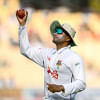Shakib's final over: A hero’s farewell or a quiet exit?

For nearly two decades, Shakib Al Hasan has been the face of Bangladesh cricket, a player who has led the team to numerous successes and united an otherwise divided nation in moments of triumph. His retirement announcement from Test cricket has suddenly provided us with a dilemma. Will we give him the heroic farewell he rightfully deserves, or will we let controversy overshadow his exit with a quiet whimper? Shakib has been at the heart of our national pride. He also has been someone who has hurt our feelings. The pendulum of success and scandal took him to different shores: from lifting trophies for the nation to causing atrophies for contacting bookmakers, for instance. The way we process his parting will reflect on not only his legacy but also our national character. This is particularly true at a time when the pivotal role of leadership is being questioned in favour of a decentred one. The next generation of players is in search of inspiration. We can pitch Shakib as a hero who embodies the art of triumph. Alternatively, we can ditch him for his numerous missteps. The choice is ours, but its impact will resonate far beyond the boundary line.
Speaking to the media before the second Test match in Kanpur, Shakib declared his decision to retire from the Test squad. He requested for security in his last match to be held before a home audience. The Bangladesh Cricket Board (BCB) has declined to provide security to the cricketer-turned-politician. Shakib's party, now out of both power and favour, has stained his cricketing merit. The player will have to return to the country with a murder case hanging over him and face a politically and emotionally charged mob. After the India Test series, the security concern may compel Shakib to opt out of the home Test series against South Africa in October. This will conclude his Test career, which commenced in May 2007 in Chattogram during a series against India. If he ends his career in India, the cycle will complete its full course.
Shakib donned the Bangladeshi cap in 2006, during an ODI series against Zimbabwe. Over the last 18 years, he has emerged as the country's most iconic cricketer. As one of "the Famous Five," dotingly dubbed as Pancha Pandab, Shakib has offered his country many moments of pride, hope, joy, and even frustrations, and united an otherwise divided country in a common concern and emotion.
ESPN Cricinfo lists the 14,000-plus runs and 700 wickets in international cricket that Shakib has to his credit. He is the first Bangladeshi cricketer to achieve the double of 2,000 runs and 100 wickets in ODIs. His slow left arm orthodox bowling earned him the glory of becoming the only Bangladeshi bowler to have taken more than 300 wickets in limited over matches. His record of the most runs and wickets for the side in T20Is has made him an attractive addition for franchise cricket worldwide. His reputation as a Bangladesh all-rounder is unlikely to be surpassed in the near future.
An injury of Captain Courageous Mashrafe Mortaza in 2009 allowed Shakib to step in as the captain of Team Tigers in all formats. Shakib won 22 of the 47 ODIs that he captained, including the famous victory against England in the 2011 ODI World Cup. In his first Test as captain, Shakib took eight wickets and scored an unbeaten 96 to give Bangladesh their first taste of an overseas series victory against the West Indies. His heroics came into play when he hauled 10 wickets and 89 runs in the first innings to give his team the first ever Test win against Australia. Shakib's cricketing prowess is evident in his longest stint as the number one all-rounder in the ICC table. His win percentage as a captain, his ability to perform at various franchise games, and his cunning strategies testify to his all-round abilities.
Off the field, however, he remains as one of the most enigmatic figures in the sport's history. The International Cricket Council (ICC) handed Shakib a two-year ban from all forms of cricket on October 29, 2019 for violating the ICC Anti-Corruption Code for Participants. He was found at fault for not reporting a bookmaker who accosted him with a match-fixing offer. Just a week before the ban, Shakib was instrumental in launching a players' strike. The rumour was that he was using his teammates to negotiate his punishment with the local board. Always confident in his position in the team, Shakib withdrew from crucial matches or took time off during tours to feature in various sponsored events, ad shootings, or to attend to his family abroad. The BCB punished Shakib's "severe attitude problem" in 2014 with a six-month ban. His career is marked by numerous misdemeanours, such as assaulting fans, making rude gestures against audience members, kicking the stumps, and bickering with umpires or opponents. His temper or calculated business ploys mar many of his on-field achievements and moments of brilliance.
His fans perceive the maverick Shakib as a fearless young man, unafraid to assert himself, while his critics view him as a conniving character whose ambitions are storied by his acquisition of numerous trade licences, fraudulent activities in the share market, and overseas business ventures. His decision to run for parliament in a controversial election only adds to his political scandals.
We, as a nation, frequently fail to separate the personal from the public. Over the last 53 years, we have gone through many ups and downs, constantly shaping and unshaping our identity. The undercurrents of the many rivers that flow through us deposit and carry away deltaic sediments, just as our identity formation does. Just like our geomorphic identity, we fail to give permanence to anything. There should not be any hesitation in carving a permanent niche for Shakib in Bangladesh's sports history. Then again, our riverine selves keep thinking about the shaking ground beneath our feet. Three of the Pancha Pandab have already departed, not with a thunderous roar but with a gentle murmur. Shakib is a tiger that has burnt bright in our forest of confusion. He deserves a hero's farewell. In the days to come, history can judge him for his personal mistakes. However, if we fail to seize this opportunity to commemorate his glory now, we will only lament a lost chance in the future.
Dr Shamsad Mortuza is professor of English at Dhaka University.
Views expressed in this article are the author's own.
Follow The Daily Star Opinion on Facebook for the latest opinions, commentaries and analyses by experts and professionals. To contribute your article or letter to The Daily Star Opinion, see our guidelines for submission.

 For all latest news, follow The Daily Star's Google News channel.
For all latest news, follow The Daily Star's Google News channel. 










Comments